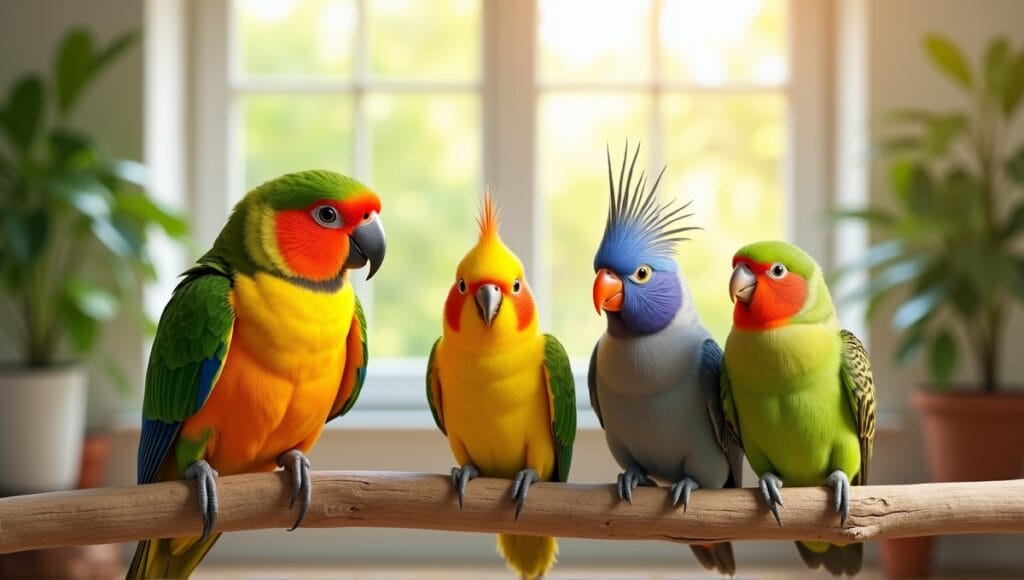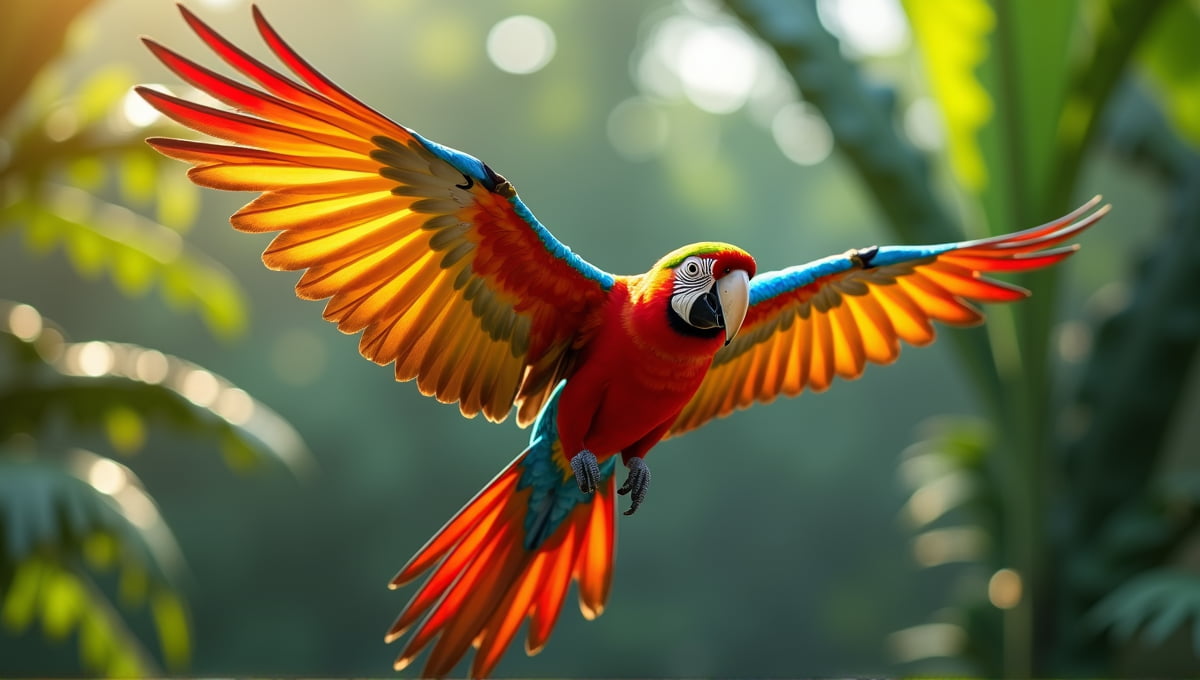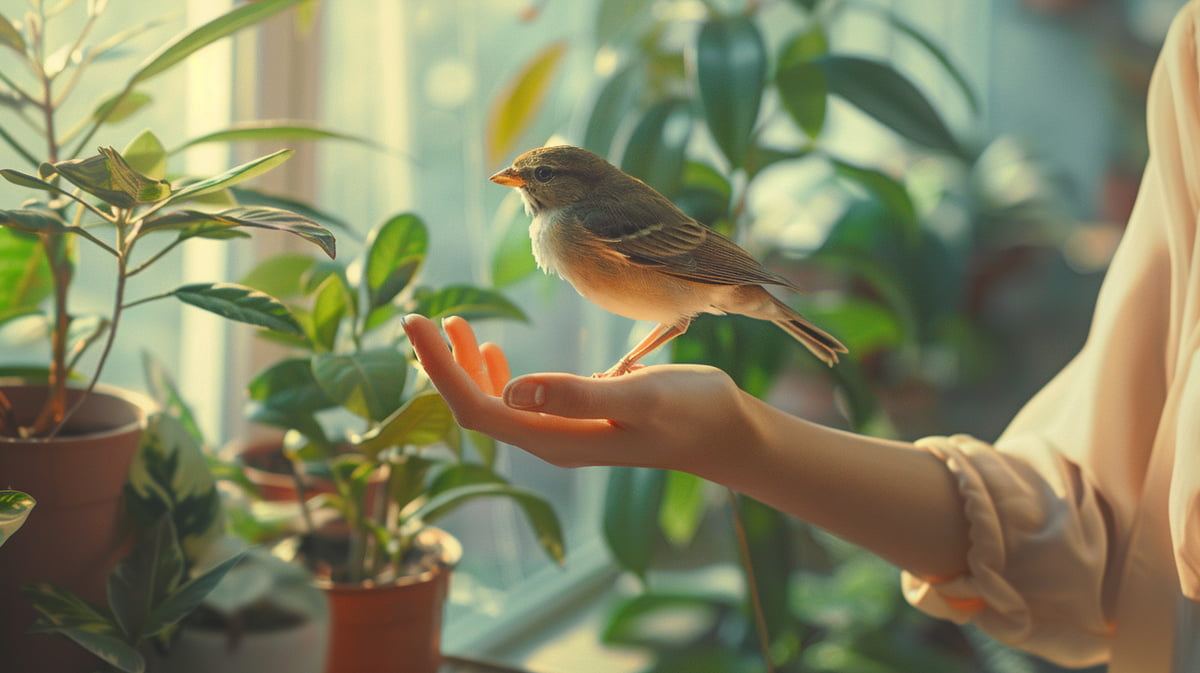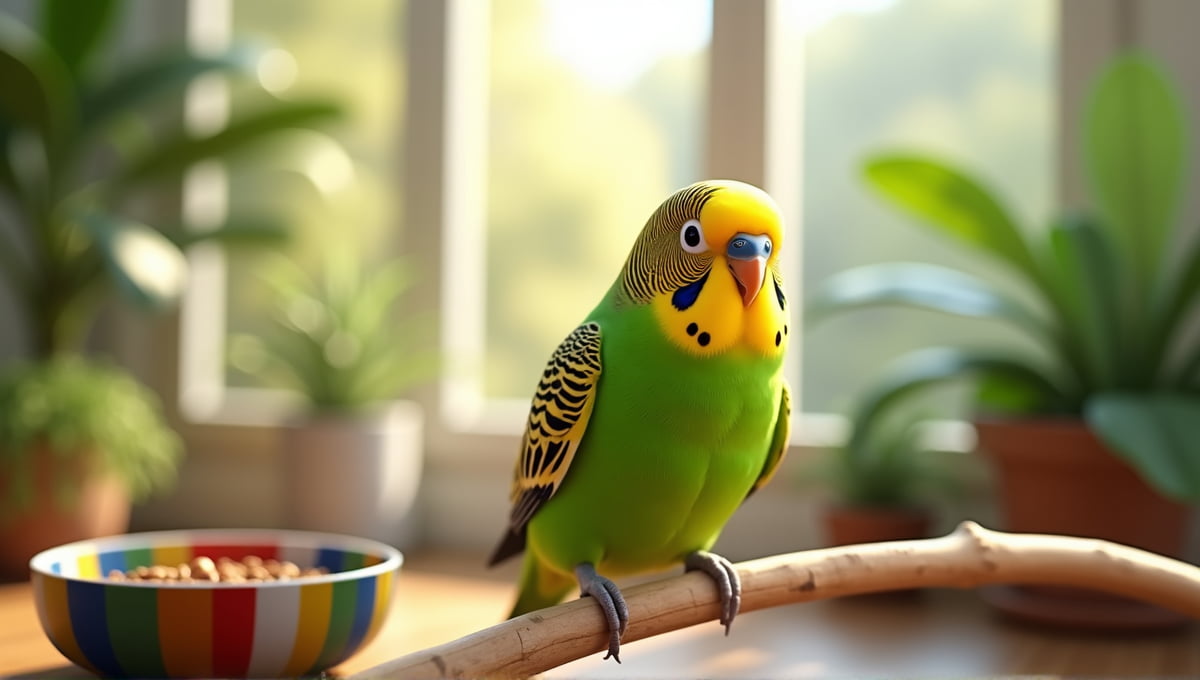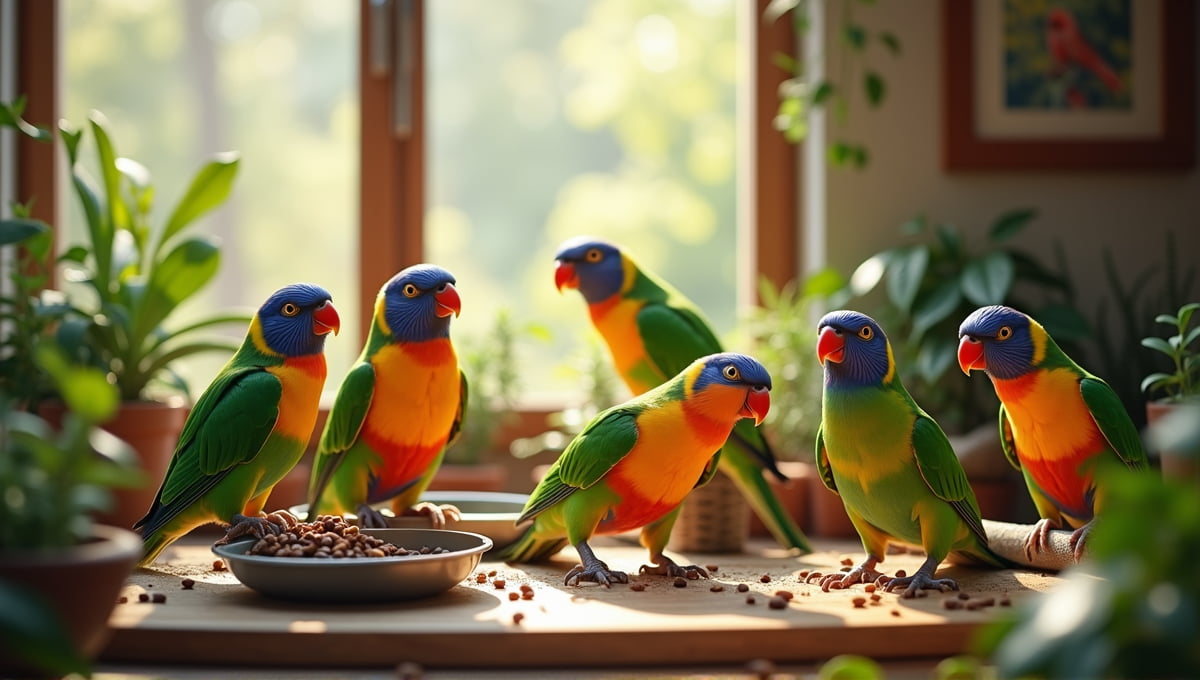Pet birds bring a special type of companionship and delight. I’ve studied many species of birds both in the wild and as a pet as an ornithologist. You’re about to learn about the best bird for your lifestyle. Each bird species, from tiny finches to massive macaws, has a different personality and care requirements. So let’s dive in and identify your perfect bird.
Types of Pet Birds: An Overview

Pet birds come in all shapes, sizes, and personalities, from tiny finches to grand parrots. Each species has its own set of special traits and care needs.
Small pet birds, such as budgies, cockatiels, lovebirds, finches, and canaries, are excellent options for first-time bird owners. They are relatively low maintenance and don’t take up much space.
Medium pet birds, including conures, quaker parrots, pionus, Indian ringneck parrots, and caiques, are a good compromise in terms of size and management. These birds are playful and don’t require a tremendous amount of space.
Large pet birds, like African greys, cockatoos, macaws, Amazons, and eclectus parrots, are incredibly intelligent and charming, but caring for them requires a lot of space, time, and attention.
Consider the following factors when selecting a pet bird:
- How much space you have
- How much time you can devote to care
- Your tolerance for noise
- Your budget for supplies and vet care
- Your level of experience with birds
Keep in mind, though, that each bird is an individual, and what works for one might not work for another, even within the same species. If you’re interested in pet bird breeding, it’s important to understand the specific needs of different species.
Popular Small Pet Birds
Budgerigars, or budgies, are commonly the first small bird that bird owners choose. These small parakeets are colorful, social, and relatively low maintenance. They can be taught to mimic words and enjoy human interaction.
Cockatiels are calm, affectionate birds recognized by their unique crests. They are slightly larger than budgies but still manageable for most households. Cockatiels are famous for their whistling and are very docile.
Lovebirds are named after their smitten behavior. These small parrots are playful and energetic. They require a lot of interaction and can become very attached to their owners.
Finches are small, active birds that are fun to watch. They aren’t typically hands-on pets, but they make great companions thanks to their cheerful chirping and acrobatics.
Canaries are famous for their beautiful song. The male canary does the majority of the singing, and their song is a delight throughout the home.
Here’s a comparison of these small birds:
| Bird Type | Size | Lifespan | Noise Level | Interaction Level |
|---|---|---|---|---|
| Budgie | 7″ | 5-8 years | Medium | High |
| Cockatiel | 12″ | 10-14 years | Medium | High |
| Lovebird | 5-6″ | 10-15 years | High | High |
| Finch | 4-6″ | 5-7 years | Low | Low |
| Canary | 5-8″ | 10-15 years | Low/Medium | Low |
These small birds are all excellent pets for beginners. Each has slightly different characteristics, so you can choose the best one for your lifestyle and preferences.
Medium-Sized Pet Birds
Medium-sized pet birds are an excellent compromise for many bird lovers. They’re larger and often more engaging than small birds, yet they don’t require as much space or specialized care as large parrots.
Conures are popular for their playful, active nature. These brightly colored parrots are smart and can learn tricks and words. They are also quite affectionate, though many conures (especially sun conures) are very loud.
Quaker parakeets (also known as monk parakeets) are social and vocal. Known for their talking ability and tendency to build complex nests, some areas have banned quakers as pets due to their potential as an invasive species.
Pionus parrots are less noisy than many other medium-sized parrots. They are beloved for their gentle demeanor and are ideal pets for anyone who prefers a low-key bird. Pionus parrots come in several stunning colors.
Indian ringneck parakeets are graceful birds with long tails. They’re smart and some individuals develop extensive vocabularies. Ringnecks are challenging to hand train, but they become very affectionate pets.
Caique parrots are often called the comedians of the parrot world. These birds are high energy, playful, and enjoy performing acrobatics. Caiques have a lot of personality in a small body.
The care requirements for medium-sized birds are as follows:
- Spacious cage (at least 24″ x 24″ x 36″)
- Daily out-of-cage time for exercise and to interact with you
- Diet of pellets, fresh vegetables, fruits, and the occasional treat
- Regular nail and beak grooming
- Lots of pet bird toys to keep their mind busy
- Regular interaction with you through training exercises
These species make great companions. They’re more interactive than small birds and less challenging to manage than larger parrots.
Large Pet Birds
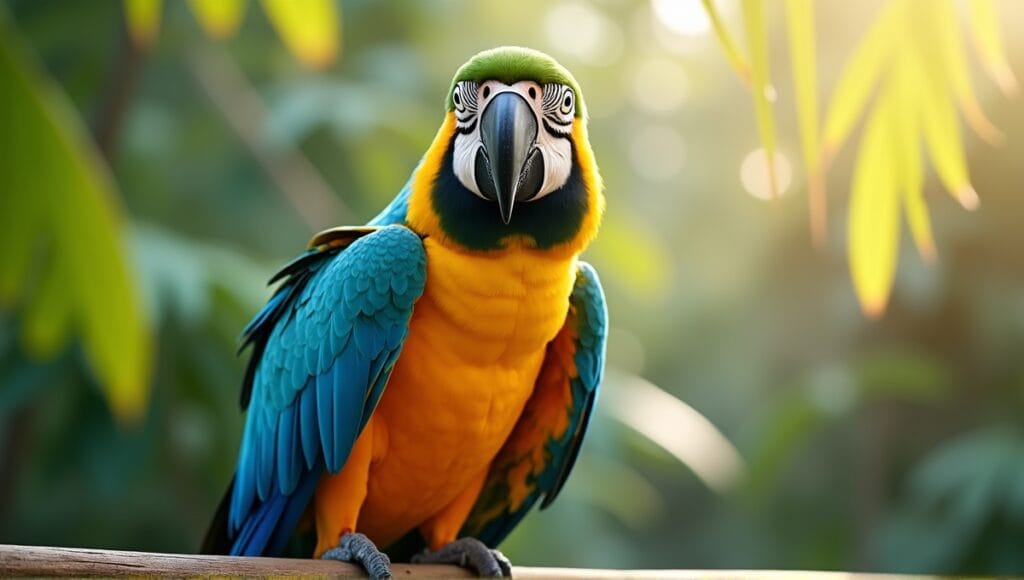
Large pet birds are some of the most intelligent and charming bird pets. They are a significant commitment, but they can form strong bonds with their owners.
African Grey Parrots are famous for their incredible intelligence and ability to mimic human speech. Some African Greys build vocabularies of hundreds of words and use them in proper context. African Grey Parrots require a lot of mental stimulation and social interaction.
Cockatoos are popular for their loving personalities and unique crests. They are very social birds that require a lot of attention from their owners. While Cockatoos are very affectionate, they can be very loud and demanding, making them a difficult pet for some people.
Macaw Parrots are the largest species of parrots, and they are also some of the most colorful. Macaws are very intelligent, playful, and they can live for several decades.
Amazon Parrots are well known for their feisty personalities and talking abilities. They are a very active bird species that needs plenty of toys and social interaction. Amazon Parrots can be quite territorial, and sometimes one person in the family.
Eclectus Parrots are unique because they exhibit extreme sexual dimorphism—males are bright green, while females are red and blue. They are generally very mellow birds and are less destructive than some other large parrot pets.
Here is a quick comparison of these large birds:
| Bird Type | Size | Lifespan | Noise Level | Space Requirements |
|---|---|---|---|---|
| African Grey | 13″ | 50+ years | Moderate | Large |
| Cockatoo | 12–24″ | 40–60 years | Very high | Very large |
| Macaw | 24–40″ | 50+ years | Very high | Very large |
| Amazon | 13–15″ | 40–50 years | High | Large |
| Eclectus | 14″ | 30–50 years | Moderate | Large |
Large parrot species are a large commitment. They all require extensive care, a specialized diet, and lots of attention. However, they can be very rewarding pets if you are the right owner.
Care Requirements for Pet Birds
All pet birds need basic care to be happy and healthy. Regardless of the size of the bird, including parakeets, parrots, and all other birds, here are some common care needs they all have in common.
Housing is critical. Your bird will need a cage that’s large enough for them to spread their wings and fly short distances. Inside the cage, you should have:
- Several perches of different diameters
- Food and water dishes
- Toys to keep them mentally stimulated
- Different textures and materials to prevent boredom
Diet and nutrition are important to keep your bird healthy. Most pet birds eat:
- High-quality commercial pellets (make up 50-70% of the diet)
- Fresh fruits and vegetables (make up 20-30% of the diet)
- Small amounts of seeds and nuts (used sparingly as treats)
Exercise and enrichment are also important to keep your bird physically and mentally healthy. Make sure you provide:
- Daily out-of-cage time in a safe, bird-proofed area
- Toys that promote foraging and problem-solving
- Regular training and interaction
Health and grooming needs include:
- Regular check-ups with an avian vet
- Nail and beak trims (as needed)
- A way for the bird to bathe or mist
- Clean, fresh water throughout the day
Social needs vary by bird species, but most pet birds are social and require:
- Daily interaction with humans
- Target training and handling
- A potential bird companion (depending on the species)
Keep in mind each bird species has its own specific care needs. Make sure you research your specific bird species to give them the best care possible. Understanding parrot anatomy can also help you provide better care for your pet bird.
Choosing the Right Pet Bird for You
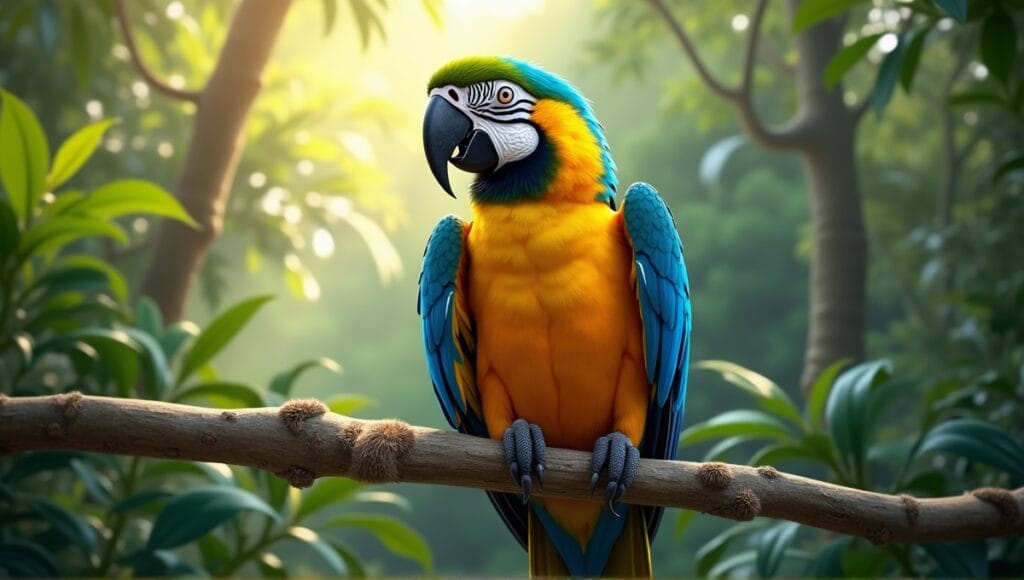
Selecting the right pet bird is a big decision, and you should choose a bird that fits your lifestyle and preferences.
Assess your living situation:
- Do you have space for a bird cage and play area?
- Are pet birds allowed in your home or neighborhood?
- Do you have a quiet space where a bird won’t be disturbed?
Consider noise levels:
- Do you dislike loud noises?
- Do you have nearby neighbors who won’t appreciate a loud bird?
- Can you tolerate a bird that makes repetitive sounds?
Evaluate time commitment:
- Do you have several hours each day to care for a bird?
- Can you make a long-term commitment to bird care?
- Do you frequently travel?
Budget for expenses:
- What are the costs to set up the bird (cage, food, toys, bowls, etc.)?
- What are the ongoing costs of a bird (food, veterinary care, toys, etc.)?
- Do you have savings set aside for unexpected bird medical costs?
Match bird personality to your preferences:
- Do you want a hands-on bird?
- Do you want a pet bird that talks?
- Do you want to handle birds or simply look at them?
Keep in mind that selecting a pet bird is a long-term decision, so take your time selecting the right bird for you. Research your options thoroughly, and consider adopting a bird from a rescue organization. With the right fit, you’ll have a great relationship with a pet bird for many years.
In Closing
Pet birds provide excellent companionship and happiness. There’s a bird for every home, from tiny finches to majestic macaws. However, each species has different care requirements, so you need to select a bird that fits your lifestyle, space, and level of commitment. When cared for correctly, birds are intelligent, loving animals that can become valuable members of your family. The right bird will provide you with years of happiness and fulfillment.


